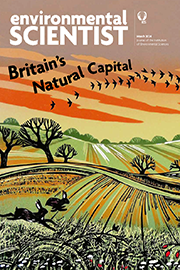Britain’s natural environment is often viewed as something that exists independently of our financial and governance systems. Whilst there are questions about whether we should reduce nature to a quantifiable entity, it may no longer be enough to advocate for our natural environment purely for its own sake. To legislate for the protection, funding, and political support of nature in Britain, we must offer robust evidence of the benefits – social, financial, and ecological – that a healthy natural environment imparts.
In this issue, authors explore some of Britain's most important ecosystems, as well as presenting expert perspectives on some of the ways we can use the concept of natural capital to the advantage of both society and the environment. Articles in Britain’s Natural Capital range from the ecological benefits provided by kelp farming on the Isle of Mull, to the significance of our urban green spaces in London and Nottingham, and the importance of recovering our vital chalk streams from degradation. Alongside responding to some of the biggest challenges facing our environment today, contributors to this edition of the journal offer persuasive and evidence-led assessments on the state of Britain’s natural capital.




